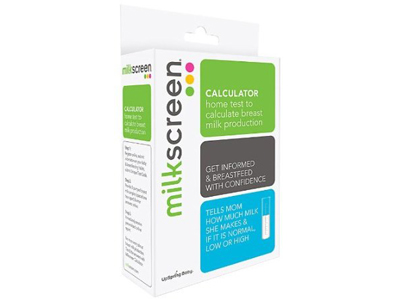Which would be worse?
Is it worse for a baby to suffer severe, unremitting hunger, become dehydrated, lose weight and possible die? Or is it worse for a mother to “lose confidence” in her ability to successfully breastfeed a child who is actually doing well?
The overwhelming majority of people would consider a starving, suffering child to be worse and a preventable child death to be the worst outcome imaginable. But not lactivists. Oh, no, for them, there is nothing more important than convincing women to breastfeed whether it is good for their baby or not. That’s why they wanted to ban a new product, UpSpring Baby Milkscreen Home Test to Calculate Breast Milk Production, a product that they have no intention of ever using, but want to be sure that no one else can use it either.
What is the Milkscreen Calculator? According to the product website:
Am I Making Enough Breast Milk for My Baby?
This is a common question breastfeeding moms ask. Many moms believe that they are not producing enough breast milk to satisfy their babies. Some moms are right, and some are wrong. Now there is a scientific way to know whether your breast milk supply is low or not: Milkscreen Calculator home test.
Are they shilling for formula manufacturers? Apparently not:
If I find out I have low breast milk supply after testing, should I supplement with formula?
NO! Most women can easily overcome a lower breast milk supply with natural methods to increase their supply. Milkscreen Calculator’s report will provide these tips if you need them, and will also recommend that you visit a Lactation Consultant to get the personal attention you need.
So what’s the problem? It can’t be that low supply doesn’t exist. We know that it happens far more often that previously thought. According to the paper Breastfeeding-Associated Hypernatremia: Are We Missing the Diagnosis?:
The incidence of breastfeeding-associated hypernatremic dehydration among 3718 consecutive term and near-term hospitalized neonates was 1.9%, occurring for 70 infants…
Conclusion. Hypernatremic dehydration requiring hospitalization is common among breastfed neonates…
The problem can’t be that the test is inaccurate. Lactivists didn’t bother to assess accuracy; they didn’t bother to assess any of their claims.
What is the problem? According to a blog post, Milkscreen Breastfeeding Assessment Test under fire, featured on the Facebook page of Mothers Against Milkscreen Breastfeeding Assessment Test:
And this doesn’t even cover the message the product is sending to new moms. Women are given formula samples at the hospital, inundated by coupons in their mailbox, questioned by well-meaning but misguided grandparents, and often harassed into supplementing with formula by medical professionals who don’t have a proper breastfeeding education. And now, Milkscreen has added insult to injury by with this product that asks if you’re making enough milk for your baby. (my emphasis)
Insult? Lactivists think it is insulting to suggest that some women do not produce enough milk to adequate nourish their babies?
That betrays the real focus of those who oppose the test. It has nothing to do with accuracy. It has nothing to do with safety. It has to do with THEIR feelings. They are not worried about babies failing to receive enough breastmilk; they are worried that their own choices are not being validated with anywhere near the fervor they demand.
The latest information from the Facebook page is that company has decided to stop selling the product indefinitely. That’s unfortunate, because we should never give in to bullies and, make no mistake, the lactivists are bullies. They are opposing a product they would never use, making claims that they never bothered to substantiate, for a reason that they have make no attempt to verify. It is more important to them that other women mirror and validate their own choice to breastfeed than whether the babies of those women are adequately nourished.
I have no idea whether Milkscreen is an accurate product or not. If it could be shown to be inaccurate or misleading, it should be removed from the marketplace, regardless of who is insulted or not. However, I have a big problem with censorship and that is exactly what the opponents of Milkscreen are trying to do. They are trying to deprive women of information that they might need because if women had that information they might make decisions of which the lactivists don’t approve.
Frankly, I think the makers of Milkscreen have made a big mistake. You can’t buy publicity like they are getting from opponents and the market for the product is everyone else in the world besides the opponents. I suspect that they would sell more Milkscreen kits now than they ever imagined in their wildest market assessments.
And lactivists are busily celebrating yet another Pyrrhic victory in the war that they are losing. By revealing themselves (yet again) to be hysterical fanatics who really don’t care whether babies suffer and starve just so long as everyone is mirroring their choices, they have make breastfeeding seem like a radical choice instead of an excellent way (but not the only excellent way) to nourish a baby.


